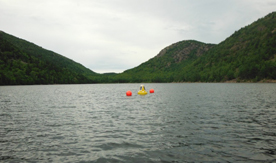On Jordan Pond

A state-of-the-art sensor buoy system has been deployed in Jordan Pond at Acadia National Park to begin a high-tech water quality monitoring program in light of recent concerns about decreasing clarity in what is considered one of the clearest lakes in Maine.
The monitoring program is made possible by a partnership led by Friends of Acadia, Acadia National Park and the University of Maine’s Climate Change Institute. Canon U.S.A., Inc., a leader in digital imaging solutions, is the official sponsor for the program. Through Canon’s support, Friends of Acadia was able to purchase a NexSens CB-400 Data Buoy and hire a full-time aquatic scientist, Courtney Wigdahl of Topsham to monitor the study.
Friends of Acadia is a nonprofit organization dedicated to projects that preserve and protect Acadia National Park and Mount Desert Island communities. Wigdahl is an alumna of the University of Maine, where she did her Ph.D. and postdoctoral research with Jasmine Saros, associate director of the Climate Change Institute.
The 187-acre Jordan Pond is 150 feet deep — the deepest and the second largest of the 26 lakes and ponds on the island. Described as one of Acadia’s most pristine lakes with exceptional water quality, Jordan Pond is the water supply for Seal Harbor.
Since 1985, the Park Service has manually monitored water quality on a monthly basis throughout Acadia’s waterways. In Jordan Pond, data analysis has shown that water clarity has been declining since the mid-1990s. In the past four years alone, water clarity has shifted from 14 meters to 12 meters, as measured using a secchi disk.
To determine the potential causes of clarity loss, as well as the effects on the broader ecosystem, the water quality monitoring will be automated with the help of the buoy sited in the deepest part of Jordan Pond. With the latest sensor technology, the buoy will monitor nearly 100 data points every day, including the amount of algae and organic material in the water column, and water pH and temperature. The data will be compiled and transmitted every 15 minutes to a receiving station located at the Jordan Pond House Restaurant.
The buoy, which will be visible approximately 2 feet above the water surface, will be in Jordan Pond for the next four months, and then will be redeployed in the spring.
The automated monitoring will provide a more comprehensive perspective on water conditions, and inform decisions about lake protection measures. Just as important, it will monitor conditions before, during and after major weather events to understand the changes the pond undergoes.
“This is likely not an isolated case. We think it is indicative of what’s happening in many lakes in Maine,” says Saros, who has been studying the lakes in Acadia National Park for the past five years, looking at the effects of and recovery from acid rain, and the effects of climate change. “Many lakes in Maine are brown because of natural organics. Jordan has a low concentration of that, but it may be increasing.
“If the changes in Jordan Pond are largely because of air pollution reduction, it’s important to know that the lake is returning to a previous state and the reduction in clarity is not a concern,” says Saros, who will lead the data analysis. “If it’s more of a sign of changes in climate with the increased frequency and severity of storms, we will be more concerned and will have to consider what we can do to mitigate the effects. For the park and for lakes across Maine, it is an important question.”
By next year, Jordan Pond’s high-resolution sensor data will be available to the public on a website and at an information kiosk at the Jordan Pond House Restaurant. The data also will be entered in the Global Lake Ecological Observatory Network (GLEON), which shares and interprets information from around the planet in an effort to understand the role and response of lakes to a changing environment.
Wigdahl will be blogging about her work with the buoy on the Friends of Acadia news site.
A Wall Street Journal article about the Canon U.S.A. sponsorship with Friends of Acadia is online.
Contact: Margaret Nagle, 207.581.3745; 207.949.4149
